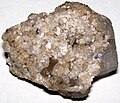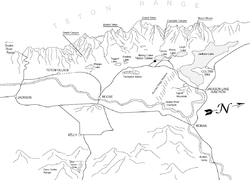The Gypsum Spring Formation is a stratigraphical unit of Middle Jurassic age in the Williston Basin. It takes the name from Gypsum Spring in Wyoming,...
3 KB (149 words) - 18:43, 28 March 2024
Gypsum is a soft sulfate mineral composed of calcium sulfate dihydrate, with the chemical formula CaSO4·2H2O. It is widely mined and is used as a fertilizer...
43 KB (4,184 words) - 04:42, 15 May 2025
Selenite (mineral) (redirect from Gypsum flower)
satin spar, desert rose, and gypsum flower are crystal habit varieties of the mineral gypsum. All varieties of gypsum, including selenite and alabaster...
19 KB (1,939 words) - 18:37, 4 May 2025
Devils Tower (category Rock formations of Wyoming)
known as the Spearfish Formation. Above the Spearfish Formation is a thin band of white gypsum, called the Gypsum Springs Formation, Jurassic in age. Overlying...
34 KB (3,251 words) - 04:33, 6 May 2025
disconformity from the underlying Middle Jurassic Gypsum Springs Formation. The Sundance Formation is known for fossils of an extinct species of marine...
8 KB (485 words) - 07:25, 21 May 2025
and Nebraska. It is a heterogeneous red bed formation, commonly with siltstone and gypsum low in the formation and sandstone and shale higher up. Other rock...
5 KB (383 words) - 00:36, 27 July 2024
There are several variable beds of anhydrite and gypsum and the central body of most of the formation is a massive salt bed. Localized red beds and green...
28 KB (3,013 words) - 00:05, 19 January 2025
fragments may have rust stains from exposure of pyrite to air, and tiny gypsum (CaSO4·2H2O) crystals from the reaction between pyrite and limestone particles...
102 KB (10,686 words) - 14:45, 16 May 2025
Karst (redirect from Gypsum karst)
+ SO2−4 → CaSO4 (formation of calcium sulfate) CaSO4 + 2 H2O → [CaSO4·2H2O] (formation of gypsum) This reaction chain forms gypsum. The karstification...
36 KB (4,028 words) - 23:02, 23 April 2025
Thumb member (category Nevada geologic formation stubs)
member of the Horse Spring Formation is a geologic formation in Nevada. It contains sandstone with beds of conglomerate and gypsum in the Neogene period...
1 KB (110 words) - 17:47, 21 May 2021
contains conglomerate, sandstone, gypsum-mudstone, and gypsum-sandstone-mudstone facies; it is undetermined if the gypsum is of marine or lacustrine origin...
35 KB (3,495 words) - 00:14, 6 February 2025
Red Hills (Kansas) (redirect from Gypsum Hills)
the large natural deposits of gypsum in this area. The dissolution of underlying gypsum beds has led to the formation of sinkholes which are common features...
3 KB (346 words) - 22:32, 21 July 2024
inflammatory diseases. Borax springs Gypsum springs Saline springs Iron springs (chalybeate spring) Radium springs (or radioactive springs) have a detectable level...
33 KB (3,366 words) - 13:12, 14 April 2025
The Bakken Formation (/ˈbɑːkən/ BAH-kən) is a rock unit from the Late Devonian to Early Mississippian age occupying about 200,000 square miles (520,000 km2)...
55 KB (6,192 words) - 00:23, 16 May 2025
record of decapod crustaceans (Astacidea, Stenochiridae) from the Gypsum Springs Formation (Jurassic) of Wyoming, USA" (PDF). Bulletin of the Mizunami Fossil...
136 KB (5,707 words) - 01:45, 19 April 2025
stages. The Carmel Formation consists of up to 1,000 feet (300 m) of mudrock and sandstone interbedded with limestone and gypsum. It was laid down in...
16 KB (1,467 words) - 16:40, 22 January 2025
Teepee structure (section Formation)
to form gypsum, for example, results in an increase of volume by 63%. In arid environments where anhydrite is widespread, a storm or spring tide could...
5 KB (610 words) - 09:48, 9 April 2025
Karst lake (category Karst formations)
collapse of caves, especially in water-soluble rocks such as limestone, gypsum and dolomite. This process is known as karstification. They can cover areas...
3 KB (317 words) - 09:20, 23 April 2023
Salina Group (redirect from Wabash Formation)
that state's Gladwin County. This formation is of economic importance for salt mining, oil reservoir creation, gypsum mining, and potential natural gas...
14 KB (1,300 words) - 15:50, 3 December 2024
is formed when water percolates through deposits of limestone, chalk or gypsum, which are largely made up of calcium and magnesium carbonates, bicarbonates...
46 KB (4,673 words) - 20:51, 20 March 2025
Glaciokarst (category Dinaric karst formations)
landforms are a result of the dissolution of soluble rocks like limestone, gypsum or dolomite by water. In the case of glaciokarst, the karst landscape has...
8 KB (799 words) - 03:39, 8 April 2025
form in other rocks, including chalk, dolomite, marble, salt beds, and gypsum. Bedrock is dissolved by carbonic acid in rainwater, groundwater, or humic...
5 KB (486 words) - 11:56, 2 January 2025
Yeso Group (redirect from Yeso Formation)
the eolian beds of the De Chelly Formation, and the Los Vallos Formation is 42% sandstone, 28% siltstone, and 24% gypsum, in contrast with the thinly bedded...
14 KB (1,388 words) - 01:51, 17 February 2024
Castile Formation. This formation consists of alternating layers of gypsum/anhydrite and limestone, as well as massive beds of gypsum/anhydrite, salt, and...
58 KB (7,014 words) - 14:19, 7 March 2025
Speleothem (redirect from Cave formation)
or aragonite). Less commonly, speleothems are made of calcium sulfate (gypsum or mirabilite) or opal. Speleothems of pure calcium carbonate or calcium...
16 KB (1,620 words) - 04:20, 10 February 2025
paleontologist Karl Mayer-Eymar (1826–1907) studied fossils embedded between gypsum-bearing, brackish, and freshwater sediment layers, and identified them as...
57 KB (6,636 words) - 22:59, 12 May 2025
Chugwater Formation to form the Nugget Sandstone. The Nugget in turn was buried by the deposits of thin red shale and thick gypsum of the Gypsum Springs Formation...
35 KB (4,882 words) - 19:51, 20 August 2024
Formation Paleogene Goose Egg Formation Permian Green River Formation Paleogene Gros Ventre Formation Cambrian Gypsum Springs Formation Jurassic Hailey Shale...
7 KB (51 words) - 07:51, 18 November 2024
List of karst areas (category Karst formations)
formation shaped by the dissolution of a layer or layers of soluble bedrock, usually carbonate rock such as limestone or dolomite, but also in gypsum...
22 KB (1,971 words) - 23:48, 29 March 2025

























